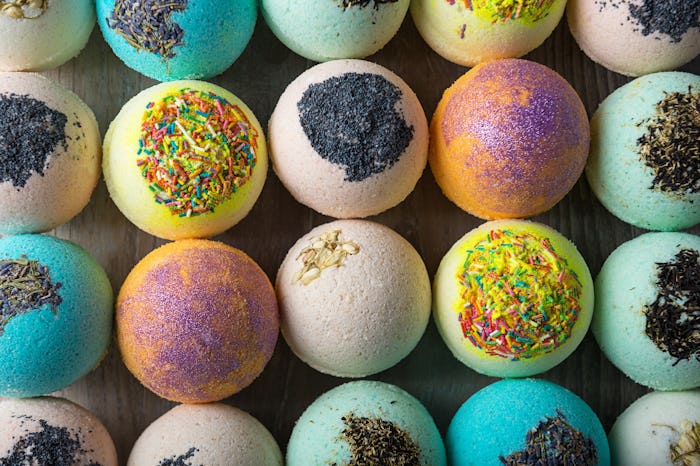Life

Are Bath Bombs Safe For Babies?
So you want to give your baby (and possibly yourself) the spa experience, with the bonus that she might fall asleep immediately after. You turn on some soothing rain sounds, gather your baby shampoo, soft towel, some lotion, and remember that lovely lavender bath bomb stashed in the cabinet since forever. But are bath bombs safe for babies?
Lush sells a special bath bomb specifically for babies called the "Ickle Baby Bot," and true to Lush, it's chock full of natural ingredients. Unlike many of the company's other bath bombs, the Baby Bot doesn't contain sodium laureth sulfate (SLES), the chemical that makes all those bubbly suds. According to Skin Deep, sodium laureth sulfate may irritate eyes, skin, and lungs.
Baby Center also noted, however, that SLES is a common ingredient found in baby products, and is considered safe. It's also far gentler than its cousin, sodium lauryl sulfate (SLS). Because baby skin is thinner than yours, you should avoid using products that contain SLS, which can cause irritation when used too frequently or in high concentrations. And you should definitely avoid SLS if your baby has eczema or sensitive skin.
So, while Lush's baby bomb is extra gentle and contains no sulfates, the truth is that all of Lush's soaps and bath products are more gentle than most. In fact, they're more like baby soap, opting for SLES over the more-irritating SLS. However, it's always best to call your pediatrician before using any particular bath product, especially if your baby is using any medicated creams, like medicine for diaper rash.
The most "natural" bombs use essential oils to create that relaxing fragrance, and according to Healthline, babies under 3 months shouldn't use essential oils. For older babies, well-diluted essential oils are considered safe, and even beneficial in small concentrations, noted the National Association for Holistic Aromatherapy. Additionally, some bath bombs contain small objects, like rose buds, which could be a choking hazard.
Unfortunately, it's difficult to know how much essential oil a bath bomb contains. Recommendations for essential oil use with babies range from two to four drops per bath. If your toddler is bathing with you in a large tub, consider using only a small piece of your bath bomb, and don't let her drink the bath water. (If she sucks some off her fingers, it's probably fine.) If you're using a small baby tub, use a bath bomb designed for babies, like the Ickle Baby Bot, or make your own with this fun recipe from Popular Science. If you cook up your own spa day, just be sure to use the amount of essential oils recommended for child baths.
Some companies keep their bath products more "natural" than others, and Consumer Reports noted that some of the more chemical-heavy bath bombs contain talcum powder, a carcinogenic substance. Synthetic scents aren't terribly healthy, either — these are usually listed on the ingredient label as "fragrance." So choose bath bombs made with essential oils, and skip the synthetics.
Bottom line? Bath bombs made for babies are likely the best choice, but you can also check your bath bomb's ingredient label. Sulfates are probably fine, but mineral oil, talc, and unspecified "fragrance" aren't safe for little ones. Also, keep in mind that you can't know exactly how much essential oil is in your bomb. Age factors into it, too, and babies under 3 months should probably stick with soaps designed for babies.
If you want to give your baby the spa experience without the hassle of ingredient sleuthing, consider using a diffuser to make the room smell of lavender, and pour some baby-safe bubble bath in the tub. When in doubt about anything that comes into direct contact with your baby, please refer to the ultimate authority on these issues, and give your pediatrician a call. Happy Spa Night.